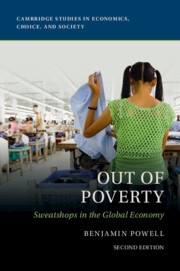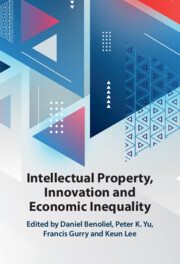Refine search
Actions for selected content:
179 results
2 - China’s Economic Displacement of the US in Latin America
- from Part I - Economic Displacement
-
- Book:
- Economic Displacement
- Published online:
- 19 November 2025
- Print publication:
- 31 December 2025, pp 25-54
-
- Chapter
- Export citation
Ottoman Justice and Political Economy of Empires: Venetian Merchants in Seventeenth-Century Ottoman Courts
-
- Journal:
- Comparative Studies in Society and History , First View
- Published online by Cambridge University Press:
- 21 October 2025, pp. 1-26
-
- Article
-
- You have access
- Open access
- HTML
- Export citation
Does ‘going green’ promote global value chain integration?
-
- Journal:
- Environment and Development Economics , First View
- Published online by Cambridge University Press:
- 22 September 2025, pp. 1-23
-
- Article
- Export citation
Populism and Institutional Fortitude: Philippine Engagement With International Law And Institutions During The Duterte Administration
-
- Journal:
- Asian Journal of International Law , First View
- Published online by Cambridge University Press:
- 29 July 2025, pp. 1-24
-
- Article
-
- You have access
- Open access
- HTML
- Export citation
Telecoupled social–ecological systems: the case of avocado in Chile
- Part of
-
- Journal:
- Global Sustainability / Volume 8 / 2025
- Published online by Cambridge University Press:
- 04 July 2025, e23
-
- Article
-
- You have access
- Open access
- HTML
- Export citation
Binding the flows: Why trade is central for a global plastics treaty
- Part of
-
- Journal:
- Cambridge Prisms: Plastics / Volume 3 / 2025
- Published online by Cambridge University Press:
- 23 June 2025, e17
-
- Article
-
- You have access
- Open access
- HTML
- Export citation
Trade and the Politics of Electoral Reform
-
- Journal:
- International Organization / Volume 79 / Issue 2 / Spring 2025
- Published online by Cambridge University Press:
- 01 July 2025, pp. 358-379
- Print publication:
- Spring 2025
-
- Article
- Export citation
Exploring the Impact of China’s Retaliatory Tariffs on US Soybean Exports with Machine Learning Techniques
-
- Journal:
- Journal of Agricultural and Applied Economics / Volume 57 / Issue 2 / May 2025
- Published online by Cambridge University Press:
- 24 March 2025, pp. 240-258
-
- Article
-
- You have access
- Open access
- HTML
- Export citation
11 - Production and the Enforcement of Rationality
- from Part II - Economic Analysis and Policy Without Preferences
-
- Book:
- Economics without Preferences
- Published online:
- 02 January 2025
- Print publication:
- 16 January 2025, pp 213-222
-
- Chapter
- Export citation
9 - Welfare and Policymaking: Pareto without Preferences
- from Part II - Economic Analysis and Policy Without Preferences
-
- Book:
- Economics without Preferences
- Published online:
- 02 January 2025
- Print publication:
- 16 January 2025, pp 176-200
-
- Chapter
- Export citation
1 - Introduction
-
- Book:
- Out of Poverty
- Published online:
- 02 January 2025
- Print publication:
- 09 January 2025, pp 1-8
-
- Chapter
- Export citation
2 - The Anti-Sweatshop Movement
-
- Book:
- Out of Poverty
- Published online:
- 02 January 2025
- Print publication:
- 09 January 2025, pp 9-22
-
- Chapter
- Export citation

Out of Poverty
- Sweatshops in the Global Economy
-
- Published online:
- 02 January 2025
- Print publication:
- 09 January 2025
Introduction
-
-
- Book:
- Intellectual Property, Innovation and Economic Inequality
- Published online:
- 05 December 2024
- Print publication:
- 12 December 2024, pp 1-14
-
- Chapter
-
- You have access
- Open access
- HTML
- Export citation
3 - Intellectual Property, Global Inequality, and Subnational Policy Variations
- from Part I - Theoretical, Empirical, and Policy Issues
-
-
- Book:
- Intellectual Property, Innovation and Economic Inequality
- Published online:
- 05 December 2024
- Print publication:
- 12 December 2024, pp 81-105
-
- Chapter
-
- You have access
- Open access
- HTML
- Export citation
12 - Managed Trade and Technology Protectionism
- from Part III - Intellectual Property and Global Inequality
-
-
- Book:
- Intellectual Property, Innovation and Economic Inequality
- Published online:
- 05 December 2024
- Print publication:
- 12 December 2024, pp 305-323
-
- Chapter
-
- You have access
- Open access
- HTML
- Export citation
1 - Intellectual Property Rights and Inequality
- from Part I - Theoretical, Empirical, and Policy Issues
-
-
- Book:
- Intellectual Property, Innovation and Economic Inequality
- Published online:
- 05 December 2024
- Print publication:
- 12 December 2024, pp 17-46
-
- Chapter
-
- You have access
- Open access
- HTML
- Export citation
11 - Inequality and Intellectual Property
- from Part III - Intellectual Property and Global Inequality
-
-
- Book:
- Intellectual Property, Innovation and Economic Inequality
- Published online:
- 05 December 2024
- Print publication:
- 12 December 2024, pp 279-304
-
- Chapter
-
- You have access
- Open access
- HTML
- Export citation
10 - Inequality and Asymmetry in the Making of Intellectual Property a Constitutional Right
- from Part II - Intellectual Property and National Inequalities
-
-
- Book:
- Intellectual Property, Innovation and Economic Inequality
- Published online:
- 05 December 2024
- Print publication:
- 12 December 2024, pp 252-276
-
- Chapter
-
- You have access
- Open access
- HTML
- Export citation

Intellectual Property, Innovation and Economic Inequality
-
- Published online:
- 05 December 2024
- Print publication:
- 12 December 2024
-
- Book
-
- You have access
- Open access
- Export citation
